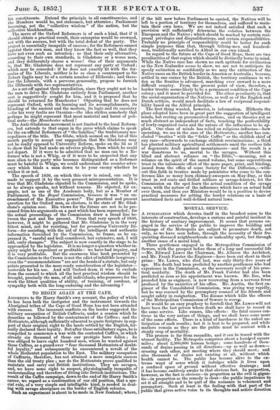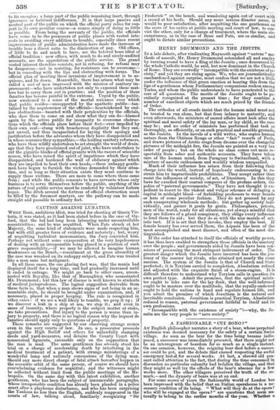MORTAL SERVICE.
A Pumacanox which devotes itself in the broadest sense to the interests of construction, develops a curious and painful incident in the history of sanitary. improvement. It seems that persons en-
d in the service of the public to improve the building and. drainage of the Metropolis are subject to premature death, not
only, as we have seen before, through the necessity of their fre- quenting diseased neighbourhoods or unhealthy spots, but through another cause of a moral kind.
Three gentlemen engaged in the Metropolitan Commission of Sewers, with the prospect before them of a long and successful life —Mr. Edward Lewes the Chairman, Mr. Allason the Architect, and Mr. Frank Forster the Engineer—have been cut short in their prime : Mr. Lewes, who died last, was only thirty-five years of age. His death had been predicted by another gentleman who had experience in the Commission, as the necessary result of his prac- tical assiduity. The death of Mr. Frank Forster had also been. predicted as soon as his appointment was known. Mr. Roe, who preceded him as engineer, is now recovering from a nervous fever produced by the anxieties of his office. Mr. Austin, the first en- gineer of the Consolidated Commission, was giving way rapidly., but he was rescued by the peremptory counsel of his friends and sought safety in resignation. The disease which kills the officers of the Metropolitan Commission of Sewers is worry.
It would be an easy prophesy to foretell that Mr. Lewes will not have been the last person whose death we shall have to record in the same service. Like causes, like effects : the fatal causes con- tinue in the very nature of thine, and we shall have some more of the same effects. There is a kind of harshness in the naked an- ticipation of such results ; but it is best to be prepared, and while matters remain as they are the public must be content with a steady crop of mortality.
The process is far from recondite, and it can be traced with the utmost facility. The Metropolis comprises about a hundred square miles; about 2,300,000 human beings ; some hundreds of thou- sands of drains passing in all directions—up as well as down— crossing each other, not meeting where they should meet; and. also thousands of drains not existing at all, without which health cannot be. The public has become alive to the ex- treme want of sense which it indulges while it lives upon a confined space of ground without effective drainage ; !and it has become suddenly awake to that obvious fact. In proproportion,however, as the fact is obvious—in proportion as the evil is. gigan- tic—in proportion as the remedy is clear—the public impatience to set it all straight and to be quit of the nuisance in vehement and peremptory. Such at least is the feeling with that part of the public that gives active voice to its thoughts and active direction to its energies; a large part of the public remaining inert, through ignorance or habitual indifference. It is that large passive and neutral part of the public on which the official party relies for sup- port in its own peculiar course—a course simply of doing as little as possible. From being the servants of the public, the officials have come to be the possessors of public places with vested inte- rests in avoiding every addition to trouble, especially since recent improvements of public administration have made the increase of trouble bear a direct ratio to the diminution of pay. Old offices, of little to do and much to have, are the beloved beau ideal of official tradition : new offices, with much to do and nicely-audited accounts, are the opprobrium of the public service. The grand vested interest therefore consists, not in refusing, for refusal may be dangerous—not in resisting, for resistance can be overcome— but in conceding with the lips and obstructing with forms. The official plan of meeting these invasions of improvement is to ac- quiesce, and lie down. Meanwhile there has arisen what may be called a sect of men impressed with the mission of sanitary im- provement—who have undertaken not only to expound these mat- ters but to carry them out in practice ; and the position of these fanatics has become painful in the extreme. Urged by the public, now awakened to a sense of the mortal nuisance over which that public resides—unsupported by the apathetic public—tan- talized by the acquiescence of the officials--heartsickened by end- less obstructions—taunted with their perplexities by the officials, who dare them to come on and show what they can do—blamed again by the active public for incapacity to overcome obstruc- tions which the officials place before their feet—ever impelled by their own zeal—stung. with treacherous duplieity that they can- not unveil, and thus incapacitated for laying their apology and justification before the advocates whom they have disappointed and in whose censures they sympathize,—the leading sanitary reformers, who have thus wildly undertaken to set straight the world of drain- age that they have proclaimed out of joint, who have undertaken to cut the gigantic blocks of official granite with the razors of scientific reason, who have raised the spirit of impatience which they have disappointed, and hardened the wall of obduracy against which they are impelled to beat their own heads,—these unhappy. gentle- men have began to furnish the victims demanded by their situa- tion, and so long as their situation exists they must continue to supply those victims. There are more to come where those came from ; and while the public consents to have servants whose only business is to serve themselves before the public, anything of the nature of real public service must be rendered by volunteer forlorn hopes. The ditch around the fortress of official obstruction must be filled by the foremost martyrs ere the pathway can be made straight and passable to ordinary martyrs,



























 Previous page
Previous page